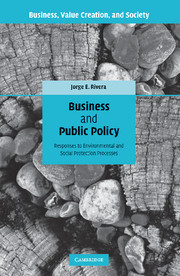Book contents
- Frontmatter
- Contents
- List of figures
- List of tables
- Foreword
- Acknowledgments
- Publication acknowledgments
- 1 Introduction
- 2 Business responses to the protective policy process in the US
- 3 Country context and the protective policy process–business response relationship
- 4 Firm-level characteristics and business responses to environmental/social protection demands
- 5 Is greener whiter? Resistance strategies by the US ski industry
- 6 Is greener whiter yet? Resistance or beyond-compliance by the US ski industry
- 7 Institutional pressures and proactive environmental protection: evidence from the Costa Rican hotel industry
- 8 Chief executive officers and proactive environmental protection: evidence from the Costa Rican hotel industry
- 9 Certified beyond-compliance and competitive advantage in developing countries
- 10 Conclusion
- References
- Index
7 - Institutional pressures and proactive environmental protection: evidence from the Costa Rican hotel industry
Published online by Cambridge University Press: 03 May 2011
- Frontmatter
- Contents
- List of figures
- List of tables
- Foreword
- Acknowledgments
- Publication acknowledgments
- 1 Introduction
- 2 Business responses to the protective policy process in the US
- 3 Country context and the protective policy process–business response relationship
- 4 Firm-level characteristics and business responses to environmental/social protection demands
- 5 Is greener whiter? Resistance strategies by the US ski industry
- 6 Is greener whiter yet? Resistance or beyond-compliance by the US ski industry
- 7 Institutional pressures and proactive environmental protection: evidence from the Costa Rican hotel industry
- 8 Chief executive officers and proactive environmental protection: evidence from the Costa Rican hotel industry
- 9 Certified beyond-compliance and competitive advantage in developing countries
- 10 Conclusion
- References
- Index
Summary
A quick reading of Chapters 2–4 may lead to a broad conclusion: more business resistance can be expected in developing countries. However, the specific point highlighted by Chapters 3 and 4 is that differences in countries' context and firm characteristics affect the level of resistance/cooperation offered by the business to environmental and social protection demands. Indeed, relatively high levels of business cooperation can be observed in some developing countries. This chapter and the following seek to illustrate this point by focusing on the study of a voluntary environmental certification program for hotels – the Certification for Sustainable Tourism (CST) – launched in Costa Rica in 1997. This program was established to improve the environmental performance of the Costa Rican hotel industry and was developed and implemented by the Costa Rican government with direct cooperation of the business sector, environmentalists, and academics. Remarkably, this was done in the mid- to late-1990s when voluntary environmental certification programs were still an innovation in the US.
Costa Rica is a country whose leadership in environmental – and social – protection is hard to explain based solely on its gross national income per capita ($5,560 in 2007, ranking sixty-fourth in the world, according to the World Bank). This middle-income level is significantly lower than the level of other countries (such as, for example, Mexico, Botswana, Russia, and Libya) with considerably poorer records of environmental protection.
- Type
- Chapter
- Information
- Business and Public PolicyResponses to Environmental and Social Protection Processes, pp. 144 - 165Publisher: Cambridge University PressPrint publication year: 2010



